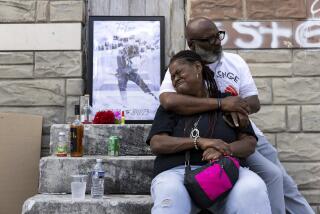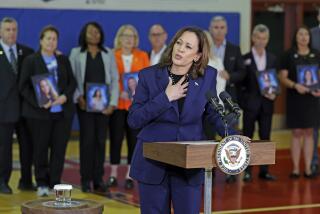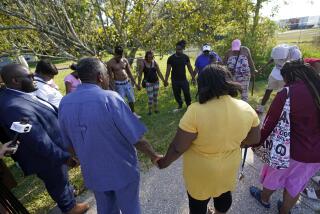In Baltimore, New York and beyond, ‘Trayvon-like’ is new descriptor
With national attention focused on the controversial shooting death of unarmed teenager Trayvon Martin and the ultimate prosecution of shooter George Zimmerman, parallels are now being drawn between that case and others across the country -- with the name “Trayvon” being invoked in rural Alabama, Atlanta, Baltimore, New York and Pasadena in cases called “Trayvon-like.”
“Clearly the Trayvon Martin case has touched a nerve in many ways that these other cases have not,” Kenneth Nunn, a law professor at the University of Florida Levin College of Law in Gainesville, told the Los Angeles Times.
Tying these cases to the shooting in Sanford, Fla., “is perhaps a defense strategy,” he said. “The participants in a case may use it as a strategy to link their case to what’s going on in Trayvon Martin. What value it will be in a case will depend on where the case is, what the evidence is.”
The teenager’s apparent innocence accounts for part of the nation’s fascination with the case, Nunn said, saying the preception of Martin is as a “young, upstanding, clean young man, [who] doesn’t have a criminal record.”
“That’s why people will want to link it. People want to say, ‘Our son is a Trayvon Martin-like figure, not a thug.’ ”
In some cases, the parallels are clear. But there’s a difference between winning popular sympathy and the sympathy of a jury, Nunn said.
“It may be true in Baltimore, in L.A., it might not necessarily be true in Alabama -- and we’ll have to see if it’s true in Florida,” he said. “There’s some people who take a very sympathetic look toward Zimmerman. They sort of put him in a Bernard Goetz category of someone who did what needed to be done to stop these marauding thugs.”
In Baltimore, the name “Trayvon” has been invoked in a case in which two white brothers are accused of beating a black teenager while patrolling their Orthodox Jewish neighborhood.
As the Associated Press reported this week, brothers Eliyahu and Avi Werdesheim were set to go on trial “in a case with similarities to the Trayvon Martin shooting.” The brothers, like Zimmerman, have claimed self-defense, saying the teen was holding a nail-studded board when they pulled up beside him in a truck and beat him in November 2010.
The teen said they yelled, “You wanna [mess] with us, you don’t belong around here, get outta here!” according to court documents cited by the Associated Press.
“Since the Trayvon Martin case, people cannot help but think about that case and draw comparisons, whether they are fair or not,” Steven Levin, a former federal prosecutor, told the AP.
Baltimore civil rights activists said they hope the Martin case will draw more attention to what they believe was racial profiling by neighborhood watch vigilantes.
“The urgency for justice [in this case] is affected by the Trayvon Martin case because of the similarities,” Cortly C.D. Witherspoon, president of the local chapter of the Southern Christian Leadership Conference, told the AP.
In Atlanta, “Trayvon” was invoked by the parents of Canard Arnold, a 17-year-old African American who was shot and killed by a security guard on New Year’s Eve. The guard, Christopher Hambrick, who is white, was never arrested or charged in connection with the shooting.
“This is very Trayvon Martin-like,” the parents’ attorney, Chris Chestnut, told, the Grio, an African American news website.
Hambrick himself disagreed. “Canard Arnold was not Trayvon Martin .... I’m not like [George] Zimmerman. I know when to use my gun,” he told the AP.
In other cases in which “Trayvon” has been invoked, the parallels are less obvious.
The Grio has attempted to liken the Trayvon Martin case to two other police-involved shootings -- one in New York, the other in Pasadena.
In early February, New York City police chased 18-year-old Ramarley Graham home, mistakenly believing he had a gun, and shot him in the bathroom.
“Unlike the Martin case, however, the three officers involved here were stripped of their guns and badges while the district attorney investigates,” the Grio noted, adding that a grand jury had been called to decide whether to bring charges against the officers.
The Grio also mentioned the killing of 19-year-old Kendrec McDade, a college student shot March 24 by Pasadena police responding to a call about an armed robbery. McDade was unarmed. The FBI is investigating possible civil rights violations in the case.
“From Hambrick in Atlanta, to Graham in New York to McDade in California, and Martin in the townhouse gardens of Sanford, Florida -- the circumstances remain eerily similar,” the Grio wrote.
Meanwhile, the Mobile [Ala.] Press-Register reported Tuesday that “a coastal community next door in Alabama is suffering over its own tragic episode that shares some similarities with the Sanford, Fla., case.”
The case involves 17-year-old Summer Moody, a white high school volleyball player in Baldwin County, Ala., shot in the head April 15 after authorities said she and three other teens were caught breaking into a fish camp. Three men who found the teens trespassing admitted to firing the shots that hit Moody.
Moody was alive Tuesday, but an attorney for her family told the Press-Register said the prognosis was grim.
Nunn, the law professor, said it will be difficult to compare the Alabama case to Trayvon because “it’s less of an extreme case — the racial dimension is not there.” But, he said, the Trayvon case may still have an influence, making prosecutors more likely to bring charges in this and other cases where shooters plead self-defense.
ALSO:
Novack murder: Trial begins for wife of Fontainebleau hotel heir
Trayvon Martin case: George Zimmerman quietly pleaded not guilty
Gideon Sundback, who did not invent the zipper, gets a Google Doodle
More to Read
Sign up for Essential California
The most important California stories and recommendations in your inbox every morning.
You may occasionally receive promotional content from the Los Angeles Times.











